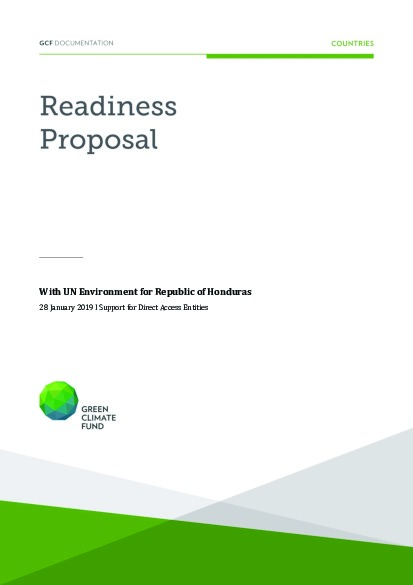Entity support for Honduras through UNEP
There are a variety of social and environmental safeguards frameworks applicable to current climate change projects and programs in Honduras , including the Cancun Safeguards for REDD+, World Bank Environmental and Social Policies, as well as the International Finance Corporation Performance Standards, which are also applied as interim standards by the Green Climate Fund. The safeguards and associated processes to apply and report on the safeguards of each framework often need to be contextualized in each country where they are applied, but the frameworks are not usually connected and sometimes they respond only to specific sectors of climate change. In addition, as safeguards frameworks are updated and as countries seek to access new and different sources of financing, there is a need for countries to develop flexible approaches to meeting multiple safeguard requirements. For this reason, Honduras is committed to establishing a National Framework for Social and Environmental Safeguards applicable to the climate change projects and programmes from different sectors that are relevant to fulfill the country’s commitments under the Paris Agreement (energy sector, solid waste, agriculture, industry, land-use change), and to do so in a participatory manner involving key stakeholders (with special emphasis on indigenous peoples, AfroHondurans and women) and other relevant actors. The project will also contribute to raising awareness of and helping to meet the GCF environmental and social standards, as well as other applicable standards, while maintaining flexibility to be able to respond to new or different safeguards requirements.
Honduras set up a National Readiness and Preparatory Support Program for the Green Climate Fund in 2017, which includes several GCF readiness projects aimed at: i) strengthening the NDA and designing the Country Programme; ii) creating enabling environments to effectively plan, implement, monitor and report about the National Adaptation Strategy; iii) and supporting strategic planning to engage with the GCF and comply with the national commitments under the Paris Agreement regarding the LULUCF sector. This project proposal will become part of this wider Programme strategy, with the intention that Honduras will capacities at project and institutional levels, and strengthen its understanding of social and environmental safeguards applicable to climate change projects and programs. This will improve the implementation of the Honduras Country Work Programme by helping to mitigate risks and enhance benefits resulting from the policies, measures and actions of these projects and programmes.
Honduras has received support from the GCF Readiness Preparatory Support for Direct Access Entity on the accreditation gap assessment and action plan for CABEI and for Fundación Vida, with each institution receiving 37,000 USD. In the case of CABEI the gap assessment and action plan were finalized, and the entity accredited. In the case of Fundación Vida the gap assessment and action plan were also finalized but it was identified that more work was necessary in order fulfil the gaps. Two of the main constrains that were identified during the Fundación Vida gap assessment were the lack of a gender and a social and environmental safeguards policy. This same need has also been noted during other accreditation gap assessments, such as the one performed by the Secretariat of Finance to become a Direct National Entity of the Adaptation Fund. MiAmbiente, committed to overtaking these barriers, agreed on starting to work towards strengthening the understanding of social and environmental safeguards applicable to climate change programmes and projects in Honduras. By helping to address these identified gaps, as well as by building institutional and project level capacities on safeguards, potential entities seeking accreditation to become direct access entities will benefit from the project proposal.
For the development of this National Framework of Social and Environmental Safeguards of Climate Change, this project proposes:
- to identify, review and analyze the various existing safeguards frameworks that are applicable to climate change projects and programmes in Honduras, including those mentioned above. This will include analysis of the content of specific safeguards and the different processes required to ensure compliance, as well as review of DAEs policies with a focus on social and environmental aspects. This, together with a review of the relevant legal and institutional frameworks, as well as elements of project design and implementation which help to ensure safeguards are applied appropriately, will result in a definition of national social and environmental safeguards applicable to climate change programs and projects to mitigate or avoid risks and enhance benefits. Engagement of key stakeholders and an approach to consider the needs and ensure adequate participation of women, indigenous peoples, and Afro-Hondurans will be fully integrated into project design and implementation;
- to develop guidance materials to help ensure that the potential social and environmental benefits and risks of actions associated with climate change programs and projects are understood and adequately considered in a consolidated but flexible safeguards framework, which helps meet multiple safeguards requirements. This will include the development of specific case studies to help evaluate impacts of actions associated with climate change programmes and projects, as well as how different safeguards can be applied to help enhance benefits or avoid or mitigate risks. It will also a gender analysis, with recommendations for how gender can be considered and integrated into the safeguards framework. This will help identify potential gaps in existing safeguards, and will also be a key input for the development of a a benefit and risk analysis guide for climate change projects and programmes, which will form the basis of the safeguards framework;
- to develop a protocol for compiling and analyzing information on the impacts of projects and programs within the framework of climate change safeguards and applicable country monitoring and reporting requirements, which in the future will inform a possible National Information System on Climate Change Safeguards.
